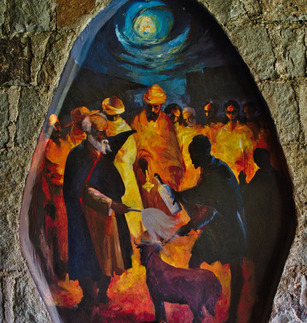|
Its a well known adage that one can feel lonely while in the midst of a crowd. We've all (I presume) experienced it; being the one standing in the corner at a party, walking alone in a foreign country and not understanding a word around you, or feeling alienated among old friends at a school reunion. Sadly, this happens even in a church.
But there's a much more insidious, and dare I say widely prevalent loneliness that is of far greater consequence. I seem to have been unknowingly circling this topic and its now crept closer and surprised me (see: where's our conversation, how to speak wisdom, suppression and expression of public passion). I'm talking of the loneliness found within relationship. Again sadly, I think Christians are no more immune to this than those outside the church. If I even look back at only the last few weeks I'm conscious how often I've seen this loneliness. The retired couple who tolerate each other out of habit, the extrovert who let his guard slip and exposed a hole of loneliness, the person who's dying and isn't letting anyone into their fears, and all the ones living on the edge of a divorce that they don't see coming. This is the loneliness that hides under cover of friendly social norms. Its the loneliness that grows because we can't find someone to share a passion we hold dearly. All relationships have some measure of this, and it naturally causes little pools of sadness that there is something that another doesn't share. This is perfectly normal, to be expected, and most people cope fine. In some ways a slice of loneliness can help one find empathy. But when that absence of a connection lies in an area of deep felt passion, of a feeling that we find hard to express, it becomes the cause of deep frustration. No wonder artists are often deeply unsettled people, they're struggling to share something burning inside. Its no wonder that painters and musicians need their art to find some way to connect their deep passions with those around them, to find an expression that will create a sharing in relationship - its something we're all hungering for. I like to talk to myself - it helps. But having someone else to share my passion is even better. Those who have a close friend with who they can really converse are truly blessed in this world of digital isolation. Those who marry a friend, likewise. But many people only have social circles of shallowness. There are all too many relationships where all they have are conversations of convenience; what maybe started as a lust never grew into love. Thinking about this type of loneliness explains a lot, especially about why couples break up. If something is deeply important to me and I have no-one to share that passion, then I'm lonely in that area. Perhaps this is a root contribution to divorce - this loneliness even in relationship? This is the only explanation I can find for one person I know who was close to me. He divorced his wife for no clear reason, and could (would) not explain it to me. Increasingly I'm thinking that he allowed the slices of loneliness to grow ever larger until they consumed his love. We have to fight this loneliness in relationship, and the church should be on the forefront of that battle. And that makes me think of about another friend, and another, and another ... all have measures of loneliness ... have they let their passions nurture a loneliness within their relationship? (And I also wonder if that is why many lifestyle Christians don't have this loneliness? Perhaps because there's no passion that they desire to share?)
1 Comment
 Source unknown Source unknown The title is with apologies to this phdcomics post. This leads to a pleading proposal. I live a life of frustration over conversation. On the one hand I have limited energy for extrovert time (that time when you have to put your body into gear so that your mind can do the social engagement thing). On the other hand, when I do switch on the external functions, I'm often disappointed by the result - especially in Christian circles. So when I recently read a blog post where the author invited people to continue the conversation by buying his book, I reacted. I actually wrote an email to him (his blog does not allow comments!). Saying "buy the book" is not conversation, however good the book may be. Books have other purposes. As a Christian I am frustrated by the dearth of opportunity to actually have real conversation. There's no shortage of topics. In church circles it gets even worse: it seems that leadership are (necessarily?) consumed in tasks (see meetings!) rather than available for true conversation, while those in the pews shortly share various degrees of naiveté or insight (and how do we know which is which?). There are some who try to cross the divisions, but generally "conversation" is perhaps more a case of messages being pushed at each other - albeit with the best of intentions. Conversation is one part listening, one part reflection, and one part speaking. We've really got that last part down well! Twitter, snapchat, blogs(!), tumblr, facebook, even lowly email: we troll the universe demanding the impossible while denigrating the possible, pushing out abbreviated "speak" at high frequency into a void of mindless ears and eyes. Do we abbreviate so we can get it out quickly, or do we do it frequently because we abbreviate; is it all a personal gish gallop rooted in our intellectual insecurity? Even within the church's culture of yesteryear its preaching, teaching, singing, notices, instructions, reactions, functions, pleasantries in the foyer, and inanities over tea until we wave "bye" and say "see you next week" meaning "... maybe, all else being equal, and if nothing more pressing comes up". Conversation takes time and commitment. We really haven't got that down well! So I propose that our next decision could be to stop talking, and start creating ... spaces. Spaces in time, spaces in places, spaces that are inviting, spaces that are listening, spaces that are reflection, and spaces that are conversing.
 Very occasionally we post someone else's writing rather than that of our own authors: this is one of them. See below this post for our regulars. From The Cost of Discipleship by Dietrich Bonhoeffer (1906-1945) (pg. 45-49) Cheap grace is the deadly enemy of our Church. We are fighting today for costly grace. Cheap grace means grace sold on the market like cheapjacks’ wares. The sacraments, the forgiveness of sin, and the consolations of religion are thrown away at cut prices. Grace is represented as the Church’s inexhaustible treasury, from which she showers blessings with generous hands, without asking questions or fixing limits. Grace without price; grace without cost! The essence of grace, we suppose, is that the account has been paid in advance; and, because it has been paid, everything can be had for nothing…. Cheap grace means grace as a doctrine, a principle, a system. It means forgiveness of sins proclaimed as a general truth, the love of God taught as the Christian ‘conception’ of God. An intellectual assent to that idea is held to be of itself sufficient to secure remission of sins…. In such a Church the world finds a cheap covering for its sins; no contrition is required, still less any real desire to be delivered from sin. Cheap grace therefore amounts to a denial of the living Word of God, in fact, a denial of the Incarnation of the Word of God. Cheap grace means the justification of sin without the justification of the sinner. Grace alone does everything they say, and so everything can remain as it was before. ‘All for sin could not atone.’ Well, then, let the Christian live like the rest of the world, let him model himself on the world’s standards in every sphere of life, and not presumptuously aspire to live a different life under grace from his old life under sin…. Cheap grace is the grace we bestow on ourselves. Cheap grace is the preaching of forgiveness without requiring repentance, baptism without church discipline, Communion without confession…. Cheap grace is grace without discipleship, grace without the cross, grace without Jesus Christ, living and incarnate. Costly grace is the treasure hidden in the field; for the sake of it a man’ will gladly go and self all that he has. It is the pearl of great price to buy which the merchant will sell all his goods. It is the kingly rule of Christ, for whose sake a man will pluck out the eye which causes him to stumble, it is the call of Jesus Christ at which the disciple leaves his nets and follows him. Costly grace is the gospel which must be sought again and again and again, the gift which must be asked for, the door at which a man must knock. Such grace is costly because it calls us to follow, and it is grace because it calls us to follow Jesus Christ. It is costly because it costs a man his life, and it is grace because it gives a man the only true life. It is costly because it condemns sin, and grace because it justifies the sinner. Above all, it is costly because it cost God the life of his Son: “ye were bought at a price,” and what has cost God much cannot be cheap for us. Above all, it is grace because God did not reckon his Son too dear a price to pay for our life, but delivered him up for us. Costly grace is the Incarnation of God. Costly grace is the sanctuary of God; it has to be protected from the world, and not thrown to the dogs. It is therefore the living word, the Word of God, which he speaks as it pleases him. Costly grace confronts us as a gracious call to follow Jesus. It comes as a word of forgiveness to the broken spirit and the contrite heart. Grace is costly because it compels a man to submit to the yoke of Christ and follow him; it is grace because Jesus says: “My yoke is easy and my burden is light.” On two separate occasions Peter received the call, “Follow me.” It was the first and last word Jesus spoke to his disciple (Mark 1.17; John 21.22). A whole life lies between these two calls. The first occasion was by the lake of Gennesareth, when Peter left his nets and his craft and followed Jesus at his word. The second occasion is when the Risen Lord finds him back again at his old trade. Once again it is by the lake of Gennesareth, and once again the call is: “Follow me.” Between the two calls lay a whole life of discipleship in the following of Christ. Half-way between them comes Peter’s confession, when he acknowledged Jesus as the Christ of God…. This grace was certainly not self-bestowed. It was the grace of Christ himself, now prevailing upon the disciple to leave all and follow him, now working in him that confession which to the world must sound like the ultimate blasphemy, now inviting Peter to the supreme fellowship of martyrdom for the Lord he had denied, and thereby forgiving him all his sins. In the life of Peter grace and discipleship are inseparable. He had received the grace which costs. I watched a video titled "They became what they beheld" (watch it - thought provoking and fun) - sadly its a truism that we most often become what we spend time beholding.
The video spoke of "the wisest words I know", and yes, in context there were wise words along with many other provocative phrases such as "clear speaking is generally obsolete thinking", and "the problem with full statement is ... it leaves no room for participation". But the video mentions "the wisest words I know"? Last night at 4am I was wrestling with this. In the morning I asked another person "What are the wisest words you know?", and received a quick answer from the surface of their thinking, as one might expect. What are the wisest words? Are there wisest words? There are of course wise words for a situation, but what are the top-most, best possible, all time greatest of wise words? That's like trying to ask what is wisdom's gravity; what words lie at the centre of wisdom's pervasive, all impacting, inescapable influence. Here are some examples of wisdom from my two most favourite authors. They live(d) a century apart, one was a firm Christian, the other is a serious atheist, yet each reflects the other and together they reflect ... truth?
I love such words because they touch a truth I know deep inside but have never been able to express. I think wise words are simply this, no more, no less: words that give a voice and life to what we know on the deepest levels to be true but have never known how to express. Of course they're not always relevant! What are the wisest words I know? What words tell me a truth I've not been able to voice? What words, like gravity, hold everything else together? "Love God with all my heart, soul, mind, and strength, for that is the source of all Joy. Love my neighbour as myself, for that is the truck to transport my joy." No joy? Garbage truck! No truck? Useless joy! No joy, no truck? I'm a fly beholding the fly paper, and I will soon become what I behold. That's wise. (I think) 
Photo by Howard Ignatius
The Whale Option - by Abigail
Most of us are familiar with the story of Jonah. God sent him with specific instructions to Nineveh. Jonah was afraid and instead tried to run away. He ended up spending 3 days in a giant fish’s belly pleading to God for help before being regurgitated on shore and ultimately going to Nineveh to do what God asked of him in the first place. I have come to call this “The whale option”. I use it to describe the numerous decisions I have made in my life that chose my path over God’s path for me. Some of the decisions big, others smaller. All carried consequences, some small, others bigger. But then comes a consequence so enormous that it brings you to your knees. It is beyond anything you have ever dealt with, beyond your capacity to handle it on your own, it is overwhelming and feels all-consuming, and you finally surrender. You finally realise that your way is not better and quite frankly you’re tired, tired of facing the whale options. You ask yourself “Why did/do I keep choosing the whale option?” And the answers flash through your mind and you wince: I don’t trust God with my life. I’m afraid that God’s way will be hard or hurt. My choice feels good and right in the moment. Surely if it makes me so happy, God is OK with it. To which you finally and desperately pray “Your Will be done Lord, not mine.” In the story of Jonah, God had a plan and even though Jonah chose the whale option, God’s plan was still realised. I take enormous comfort from this. That even though I have chosen the whale option time and again, God is sovereign (Acts 4:24-28), His ways are higher and my choices can’t derail His plans for me. This doesn’t mean that I want to keep choosing my way over God’s because as I have witnessed, and felt, my way leads to wasted time, wasted talent, sometimes conflict but almost all the time, debilitating heartache. God knew before I existed that I would make the choices I have made. Yet He still gave up His son for me (Romans 8:32-33), still chose me to be His daughter (John 1:12-13) and still promised never to leave me nor forsake me (Hebrews 13:5) and that nothing can separate His love from me (Romans 8:38-39). Talk about grace - that undeserved, loving forgiveness that my life is a living testimony to. Surely one’s response to this divine, unconditional love, is a life surrendered to the God of Love, to the Creator, the Alpha and Omega, the omniscient, omnipotent God above all gods? Yes. So here’s to fewer and fewer, and ultimately no more whale options, as I learn to hear God, obey Him and trust Him to direct my steps through this life. Things trigger me. The Cornwall Alliance have triggered me ... perhaps that's what they wanted? They claim Christ, I know that I know Christ, and I am offended by their rhetoric to the point of anger. We all have our thresholds, and when we're pushed too far we react.
This is my reaction - is it Godly? I'll give details a bit further on, but the question I want to pose is, when is anger ok? Anger is a dangerous emotion but not in itself ungodly. My triggered reaction could also be wrong because I am myself deluded ... I accept that possibility. As with all emotions, understanding the context and getting the facts is really important. Now, I am generally ambivalent about people who distort facts for their own agendas; we're so surrounded by factual abuse all the time (for example, the pervasive advertising and political rhetoric) that we've become largely numbed to the almost-lie and the outright lie. But when someone denies a deluge of clear and robust evidence, and then also invokes the authority of Christ to support their delusion, and (ab)uses the suffering of people as an emotive lever for their distortions -- that's when my threshold is really crossed and I get angry. I recognize that some may do this out of a genuine belief in their non-truth, and in such circumstances I get merely irritated and can accept that they are not deliberately setting out to deceive. Then I have to transform my anger at the situation into compassion for the person -- all the while being very careful to examine myself that I am not in turn being arrogant, self-righteous and Pharisaical. So I have a recent problem; I've encountered a persistent and actively promoted delusion from named Christians who are using the suffering of the poor to invoke additional emotive support for their position. I don't know if they genuinely believe their own fallacy -- it's possible -- but I still feel angry. What is this about? It's about a Christian organization (at least in name) saying that the multi-generational suffering caused by climate change is a lie, that there is no problem, and then actively calling on people to oppose any action to address climate change in the name of protecting the poor! It's that last step that pushes me over the limit; believe your delusion if you want, but for heavens sake don't abuse the real suffering of the poor for your agenda, when in fact all you're doing is adding generations of increased suffering! (Deep breath). For the record, I am a Christian (and not just culturally-Christian ... I know Jesus), I live in one of these countries filled with the poor, and I know the facts of climate change. How am I supposed to respond? The Cornwall Alliance describe themselves as "A coalition of theologians, pastors, ministry leaders, scientists, economists, policy experts, and committed laymen, the Cornwall Alliance is an evangelical voice promoting environmental stewardship and economic development built on Biblical principles." Sounds good so far. Their website is filled with great evangelical sounding language, their statement of faith could be taken from many a mainline church, and they even have the ubiquitous "Donate" button. It almost makes one want to join. But scratch the surface and you find they are firmly in the climate change denial camp. I don't know how anyone who does due diligence on the facts can possibly come to that conclusion. The kicker is in their latest "Landmark Document" which says “Protect the Poor: Ten Reasons to Oppose Harmful Climate Change Policies”. This is reprehensible. To be clear, this is what they want: to promote inaction on responding to the largest long-term global threat facing the world, and which places the most vulnerable on the front line of impacts. And they do this in the name of Christ. Why are Christians so silent and unthinking on this issue? Why have we allowed Christ to be leveraged in creating an irrational polarization among the global minority population of one country who suffer under the delusion of self-importance simply because of the power their internal actions have on the rest of the world? What should be my response? Our response? What is the Christian response? Anger against abuse of the weak and vulnerable seems to me to be Godly. Here's a fresh take on the frequent calls to be a radical Christian:
"... the underlying theology behind oft-heard calls to be wild and crazy radical believers—as if Christianity were an extreme sport—is works righteousness in a new, consumerist mode. For some time, radical has been a favorite word of advertisers and ideologues alike. Every website with something to sell now routinely promises a transformative experience." Read the full article here. |
Important: The views expressed on this blog do not necessarily reflect the official position of our church
Like to Write? Archives
June 2015
|




 RSS Feed
RSS Feed

